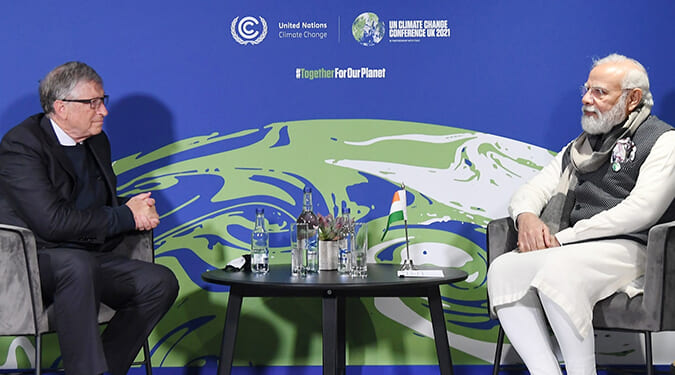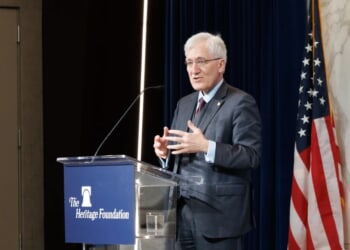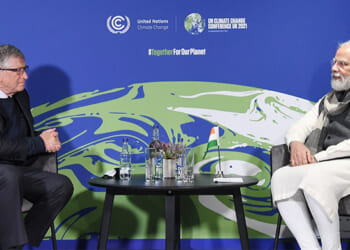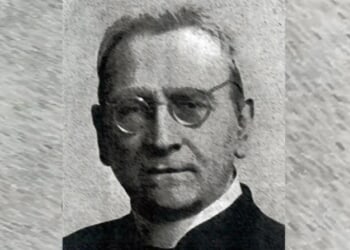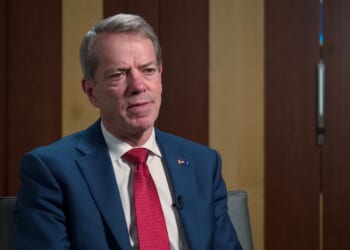
I didn’t see this coming. I could hardly believe the news article that came across my desk the other day: none other than Bill Gates was urging climate advocates to rethink their priorities and rhetoric so that their work truly serves the good of the world. Remarkably, he even says something that could have come straight from a papal encyclical: our concern for people ought to outweigh our fixation on the planet’s temperature. In this latest missive, Gates contends that one metric that should take precedence over emissions: the difference our actions make in improving human lives.
This is what I’ve been teaching for years, expounded in recent magisterial teaching under the banner of integral ecology. But to hear it from the Microsoft founder, a man who has spent decades funding efforts to reduce human impact on the climate, was something else entirely. After you finish this column, I encourage you to take five minutes to read at least part of Gates’s article. Yes, you read that right: Bill Gates has written a remarkably nuanced piece on climate change—“Three tough truths about climate” (Oct. 27, 2025)—and you really should read it. To be sure, there are things in there that you might disagree with. But Gates, for all his flaws, has brought a welcome dose of sanity to the climate conversation—offering, along the way, a clear snapshot of where things really stand today.
But the purpose of this piece is not simply to praise Bill Gates or restate what he’s recently said. After summarizing a few key highlights, I want to connect his insights with what our popes have taught on the subject and draw out a few implications from that dialogue. Indeed, I believe the popes could learn something from the nuance Gates brings to this discussion.
Gate’s uncomfortable truths about climate
“In a few decades, cataclysmic climate change will decimate civilization. The evidence is all around us—just look at all the heat waves and storms caused by rising global temperatures. Nothing matters more than limiting the rise in temperature.”
We’ve all heard this familiar argument, or rather harangue, more times than we can count. Every time there is a tornado, hurricane, or heat wave, the national news automatically pins the blame on climate change. From the impression you’d get watching the headlines, deaths from heat and natural disasters are skyrocketing—and things are only getting worse.
“Fortunately for all of us,” says Gates, “this view is wrong.” Consistent with the broad consensus of climate scientists and the teaching of recent popes, he maintains that rising global temperatures stem from human-generated greenhouse gases and will most severely affect those in the poorest countries. However, in this latest piece, he breaks ranks by emphasizing that climate change will not bring about humanity’s demise.
What’s more, while he is by no means the first person to point this out, Gates stresses that the doomsday narrative so often pushed by environmentalists turns the whole affair into a zero-sum contest over degrees on a thermometer that ends up “diverting resources from the most effective things we should be doing to improve life in a warming world.”
Gates backs up his thesis with many lines of evidence. For example, he counters the prevailing heat-death narrative by pointing out that cold-related deaths actually outnumber heat-related deaths globally by a ratio of ten to one. Moreover, he notes that heat deaths worldwide are, in fact, on the decline—not because global temperatures are going down, as one might assume, but thanks to advancements in technology.
To illustrate, he offers the tragic real-life scenario of “the government of one low-income country” (read: Sri Lanka) that rashly banned synthetic fertilizers a few years ago in the effort to curb climate change. As could have easily been predicted, this resulted in farmers seeing their yields plummet, inflation skyrocket, and countless people suffering needlessly—all because it was decided that near-term human welfare needed to take a backseat to lowering emissions. Rather than blaming one particular entity, Gates notes that these sorts of unforced errors result from wealthy lenders and shareholders pressuring developing nations to leave oil, gas, and coal in the ground instead of taking easy steps to bring reliable electricity to their homes, schools, and health clinics.
Some parts of Gates’ essay read almost as if they could have been written by a right-leaning American pundit—something we know Gates decidedly is not. Citing research from the University of Chicago’s Climate Impact Lab, the essay builds on what I mentioned above by inviting readers to consider what happens to climate-related deaths when economic growth occurs in low-income nations.
The answer? The projected number of such deaths drops by fifty percent compared to what is otherwise predicted. And here is Gates’s takeaway:
Since the economic growth that’s projected for poor countries will reduce climate deaths by half, it follows that faster and more expansive growth will reduce deaths by even more. And economic growth is closely tied to public health. So the faster people become prosperous and healthy, the more lives we can save.
And how do we accomplish this? Defying the usual script, Gates urges policymakers, scientists, entrepreneurs, and investors to put energy, health, and agriculture at the center of their strategies. Unapologetically, he argues that in deciding how to spend our limited resources, we should address issues such as disease and extreme weather in proportion to the suffering they actually cause. And, as he stresses multiple times in the article, even as climate changes affect the poor above all, weather-related deaths do not hold a candle to deaths from poverty and disease—from diarrhea due to polluted water, from malaria spread by mosquitoes, and more. But, as he avows, vaccines are the undisputed champion when it comes to lives saved per dollar spent.
The implication may sound obvious to you and me, but it is striking in this context because Gates refreshingly chooses to make explicit: this development requires the use of fossil fuels. Not only that, but in a move often deemed anathema in environmental circles, he also champions the development of nuclear energy. And he does not just advocate for it in words—he is putting his money behind it, funding a next-generation nuclear power plant currently under construction in Wyoming.
Unlike some progressives seem to be, Gates is aware that solar and wind are not available around the clock. Against many on the left, he can distinguish the good of nuclear energy from the morally fraught issue of nuclear weapons. In contrast to the popular image of green, radioactive goo bubbling inside nuclear plants, Gates—and others who understand the technology—know that nuclear energy is not only clean in terms of greenhouse emissions but increasingly safe and low-impact in its environmental impact on humans and other creatures.
Meanwhile, unlike some conservatives who think developing alternative energy is not a priority, Gates knows that fossil fuels are in finite supply on this planet and will run out before many complacently assume (as one of my conservative environmental engineer friends points out, this will not occur in our generation, but in the life of our great-grandkids). The exact timeline predicted for this is probably not something we should put much stock in, but the reality remains: it is going to happen at some point, and God is not likely to start supplying us with oil and coal from Mars just because we have run out here on Earth.
If Gates’s common-sense warnings against prioritizing hypothetical future improvements over the welfare of real people in the present echo arguments conservatives have been making for years, the realism with which he envisions their implementation is equally refreshing. He even dares to use the “T” word that’s too rarely heard on either side of the political aisle—namely, “we have to make tradeoffs so we can deliver the most benefit with limited resources.”
I am sure many readers will be familiar with Thomas Sowell’s quip: “There are no solutions. There are only trade-offs.” Regardless of how literally that saying ought to be taken, the fact is that tradeoffs are something many environmentalists would rather not talk about. Some activists have such high idealism about energy conservation—a zeal that can only be described as religious fervor—that they refuse to make the practical concessions necessary to keep the proverbial lights on. Gates is not the first to realize that this is a problem, but it is noteworthy that someone in his position did.
What can Gates teach the Church about climate?
If I have been so pleasantly surprised by much of what Gates said in his recent essay, it is partly because we have, on the whole, seen far less nuance from the Catholic Church when it comes to the matter of climate change.
To be sure, I am among those who deeply appreciate the work of recent popes in the matter of the environment—especially the introduction of “integral ecology” into the papal lexicon. The Church has wonderful, life-changing things to say about inhabiting creation well, rooted in the biblical notion of covenant and the Patristic conviction that the created world is God’s “first book.”
Moreover, her emphasis on human ecology—the recognition that the human person is part of the environment and is endowed with a nature that must be respected from conception to natural death—is an essential contribution, something almost always missing from secular environmentalism. Papal concern for a looming “ecological catastrophe” goes at least as far back as Paul VI in 1970, with John XXIII expressing incipient concerns already in his 1961 encyclical Mater et Magistra.
And yet, reading Gates’s letter, I cannot help but notice the greater nuance in his treatment of the specific issue of climate change with respect to that of our recent popes. In 2010, Benedict XVI addressed the issue with his characteristic balance and prudence, treating it as one among a host of interconnected concerns—desertification, declining agricultural productivity, pollution of rivers and aquifers, loss of biodiversity, and deforestation in equatorial and tropical zones. As I observed here at Catholic World Report, Francis’s handling of the issue, both in his encyclical Laudato Si’ and in his 2023 exhortation Laudate Deum, was much less balanced, appearing more to contribute little beyond echoing the talking points of international diplomats and NGOs.
Indeed, Francis’s handling of the issue lacked the very nuance and realism that Gates brings to the discussion: a frank acknowledgment of the grave human cost—and futility—of many current climate initiatives. Nowhere in the document do we find any recommendation to pursue nuclear energy. It merely bemoans nuclear waste, seemingly oblivious to how clean the technology really is—especially in light of recent advances.
What’s more, Francis spent a lot of energy criticizing the West’s role in climate change while ignoring the fact that China produces more greenhouse gas emissions than all developed nations combined.
While we are obviously not very far into Leo’s pontificate, we have seen that the pontiff’s approach has so far mirrored that of his predecessor, focusing on the anthropogenic impact on the atmosphere as reflected in natural disasters. One hopes that Pope Leo, whose teaching I hold in high regard, will take note of the recent work of Gates and others and, in time, introduce a measure of nuance to the climate discussion that has heretofore been lacking.
Such a development would appear natural, given the American pontiff’s continuity with his predecessors in his concern for the poor—not only those of the future, but those in need right now. In particular, this author would be grateful if Pope Leo were to revisit the promise of nuclear energy—not only because of recent technological advances but also given that its peaceful and safe use was endorsed by Paul VI, John Paul II, and Benedict XVI.
Conclusion: What the Church can teach Gates about life
On the whole, I have been more positive here about Bill Gates than about the Catholic popes. This is not out of any intrinsic desire or proclivity, but because we Catholics ought not merely to match our secular counterparts in these matters, but to be better. And I do not think we are there yet when it comes to nuance in the matter of nuance in relation to climate change.
This is not because I do not agree with recent popes that our species’ use of fossil fuels is meaningfully contributing to climate change. Belief one way or another regarding the scientific causes of climate change is not a de fide matter, so we Catholics can disagree with each other here. And, being a theologian rather than a climate scientist, all I am doing is provisionally trusting the data that the experts in the relevant area largely agree upon.
Regardless, in keeping with our both/and tradition, Catholics are entitled to hold a handful of convictions simultaneously that few others appear willing to hold in balance: 1) to agree with the pope and the majority of experts that anthropogenic climate change is real; 2) to agree with Gates that some things are more important than lowering our emissions; 3) to insist that the Church’s response be more nuanced than it heretofore has been.
Having said this, there is at least one crucial thing that our most recent popes have gotten right related to climate—something it would truly astonish me to see matched by Bill Gates.
It stems from the fact that he is coming at this from a secular point of view. While not necessarily problematic per se, Gates’s frequent recourse to proportionality and his claim that “our chief goal should be to prevent suffering” recall John Stuart Mill’s utilitarianism. From this point of view, right and wrong are determined by the consequences of one’s actions. In such a system, no act is considered intrinsically evil—contrary to John Paul II’s authoritative teaching that some acts are evil by their very nature.
With that little bit of background, here’s the problem. By way of making a strong case for prioritizing improvements in health and agriculture over reducing emissions, Gates approvingly notes that industrialization not only leads to higher child survival rates but also correlates to something “unexpected,” which he praises: people in developed nations tend to choose smaller families. I have no reason to doubt the correlation, or to deny that it carries with it some positive consequences—such as reduced poverty and hunger. But seeing fewer children as a net positive is a tough sell for Catholics—especially for those of us who need a Ford Transit just to get our families around town. Not only that, but one human cost often associated with climate-related policies—and notably absent from Gates’s calculus—is the staggering number of deaths brought about by abortion.
Here again, we find in Catholicism’s vision of human ecology something that our secular counterparts almost invariably miss. Roman pontiffs have always been clear that more children are not the problem. Of course, Paul VI is famous (or infamous, from a certain perspective) for reiterating the Church’s perennial teaching on the immorality of artificial contraception. Even before him, John XXIII’s Mater et Magistra solemnly reminded Catholics that we are “not permitted to use certain ways and means which are allowable in the propagation of plant and animal life.” The contraceptive pill would clearly fall within the scope of this proscription.
Every pope since then has reaffirmed this teaching. But what might surprise some is that none other than Pope Francis has been the most vocal in challenging the mainstream overpopulation narrative. In a 2024 address, for instance, Francis recalls earlier doomsday claims about overpopulation—think Thomas Malthus’ 1798 Essay on the Principle of Population and Paul Ehrlich’s 1968 The Population Bomb. Francis, in response to the alarmist claims triggered by these books—and whose predictions failed to materialize on schedule—offers a different perspective:
Human life is not a problem—it is a gift. And at the root of pollution and starvation in the world are not children being born, but the choices of those who think only of themselves, the delirium of an unbridled, blind and rampant materialism, of a consumerism that, like an evil virus, undermines the existence of people and society at the root. The problem is not how many of us there are in the world, but the world that we are building. This is the problem: not children, but selfishness, which creates injustice and structures of sin.
And then, stunningly, Francis makes an even bolder claim: not only is the earth not on a trajectory toward overpopulation, but we are, in fact, suffering from underpopulation. Illustrating the point by calling out the growing tendency in the Western world to replace children with pets, the Argentine pontiff comments: “There is no shortage of dogs and cats. These are not lacking. There is a shortage of children. The problem of our world is not the children who are born: it is selfishness, consumerism, and individualism.”
In another place, Francis described the current situation as a “demographic winter,” again lamenting people pretending that owning dogs and cats in place of children is parenthood, adding that this denial of genuine fatherhood and motherhood “diminishes us, it takes away our humanity.” To be sure, the pope acknowledged that having children—whether naturally or by adoption—is “always a risk.” Parenting is demanding even as it is deeply joyful—and it does young people no favor to pretend otherwise. And yet, Francis has this to say:
It is a risk, yes: having a child is always a risk, either naturally or by adoption. But it is riskier not to have them. It is riskier to deny fatherhood or to deny motherhood, be it real or spiritual. A man or a woman who does not voluntarily develop a sense of fatherhood or motherhood is lacking something fundamental, something important.
With this language of “risk,” I cannot help but think of Luigi Giussani’s exhortation to take “the risk of education” and Benedict XVI’s invitation to embark on “the experiment of faith.” I hope that Pope Leo XIV will carry on the legacy of these great thinkers by continually calling us to make our faith concrete and lived, even when it requires heroic sacrifice. And I hope that he not only brings greater nuance to Francis’s words on climate but also advances his strong witness to the truth about population and the intrinsic blessing of children.
If you value the news and views Catholic World Report provides, please consider donating to support our efforts. Your contribution will help us continue to make CWR available to all readers worldwide for free, without a subscription. Thank you for your generosity!
Click here for more information on donating to CWR. Click here to sign up for our newsletter.

